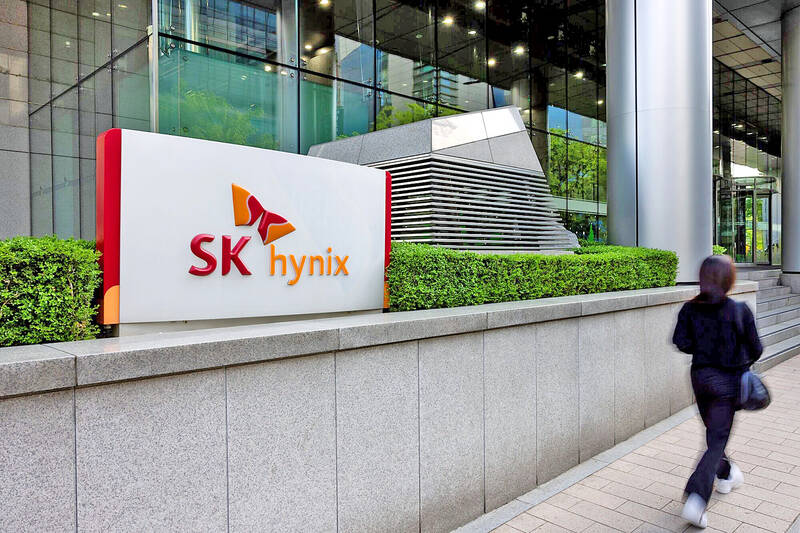South Korea’s financial watchdog is looking into Morgan Stanley’s order to sell SK Hynix Inc shares before research analysts at the bank cut their recommendation on the stock, another sign of the country’s increased scrutiny of global banks and hedge funds.
The Financial Supervisory Service (FSS) has asked Morgan Stanley Seoul to submit documents for an examination into whether the US firm complied with regulations about a research report dated Sept. 15 that downgraded SK Hynix’s stock, an FSS spokesperson said.
South Korea’s capital markets laws prohibit publishers of market analysis from trading financial products subject to their analyses for 24 hours, in order to prevent insider trading based on non-public information, the spokesperson said.

Photo: Cho Seong-joon, Bloomberg
The Seoul branch of Morgan Stanley on Sept. 13 placed an order to sell about 1.01 million shares, about three times larger than a day earlier, media outlet Yonhap News reported.
Morgan Stanley analysts downgraded SK Hynix to “underweight” from “overweight” two days later and cut the bank’s price target from 260,000 won to 120,000 won (US$194.22 to US$89.65), saying “memory conditions are beginning to deteriorate” and investors should consider “moving up to quality in Samsung and value-oriented end markets.”
Local markets were shut for the Chuseok holiday so SK Hynix shares were not trading between the close on Sept. 13 and the reopen on Thursday last week. The chipmaker’s stock tumbled more than 11 percent intraday when it resumed trading and ended the day 6.1 percent lower.
A Morgan Stanley spokeswoman declined to comment.
The FSS’ move is not unusual, Korea Capital Market Institute senior research fellow Sungbok Lee said, who used to work for the market regulator.
“If a domestic securities firm or bank did the same, FSS would have taken the same approach. It is only natural for a financial authority to be obligated to find out the facts,” he said.
Activities of global banks and hedge funds have been under the microscope in recent months in South Korea, as authorities boost steps to weed out naked short selling — a practice of selling shares without borrowing them first — which is illegal in the nation’s US$1.8 trillion stock market. They have also made efforts to impose tougher penalties for stock manipulation and other unfair trades.
The FSS would start a wider probe if the examination indicates Morgan Stanley might have violated its obligations, a person familiar with the matter said, who asked not to be named.
The Korea Exchange had already begun an account analysis of Morgan Stanley over any possible irregularities in its trading of SK Hynix shares, Yonhap reported.
SK Hynix has been an investor favorite as the company rose quickly to become the dominant supplier of high-bandwidth memory (HBM) chips that work in conjunction with artificial intelligence accelerators.
Yet, foreign investor buying in the stock has waned recently as Samsung Electronics Co has been making progress in raising its HBM output.

SETBACK: Apple’s India iPhone push has been disrupted after Foxconn recalled hundreds of Chinese engineers, amid Beijing’s attempts to curb tech transfers Apple Inc assembly partner Hon Hai Precision Industry Co (鴻海精密), also known internationally as Foxconn Technology Group (富士康科技集團), has recalled about 300 Chinese engineers from a factory in India, the latest setback for the iPhone maker’s push to rapidly expand in the country. The extraction of Chinese workers from the factory of Yuzhan Technology (India) Private Ltd, a Hon Hai component unit, in southern Tamil Nadu state, is the second such move in a few months. The company has started flying in Taiwanese engineers to replace staff leaving, people familiar with the matter said, asking not to be named, as the

The prices of gasoline and diesel at domestic fuel stations are to rise NT$0.1 and NT$0.4 per liter this week respectively, after international crude oil prices rose last week, CPC Corp, Taiwan (台灣中油) and Formosa Petrochemical Corp (台塑石化) announced yesterday. Effective today, gasoline prices at CPC and Formosa stations are to rise to NT$27.3, NT$28.8 and NT$30.8 per liter for 92, 95 and 98-octane unleaded gasoline respectively, the companies said in separate statements. The price of premium diesel is to rise to NT$26.2 per liter at CPC stations and NT$26 at Formosa pumps, they said. The announcements came after international crude oil prices

A German company is putting used electric vehicle batteries to new use by stacking them into fridge-size units that homes and businesses can use to store their excess solar and wind energy. This week, the company Voltfang — which means “catching volts” — opened its first industrial site in Aachen, Germany, near the Belgian and Dutch borders. With about 100 staff, Voltfang says it is the biggest facility of its kind in Europe in the budding sector of refurbishing lithium-ion batteries. Its CEO David Oudsandji hopes it would help Europe’s biggest economy ween itself off fossil fuels and increasingly rely on climate-friendly renewables. While

SinoPac Financial Holdings Co (永豐金控) is weighing whether to add a life insurance business to its portfolio, but would tread cautiously after completing three acquisitions in quick succession, president Stanley Chu (朱士廷) said yesterday. “We are carefully considering whether life insurance should play a role in SinoPac’s business map,” Chu told reporters ahead of an earnings conference. “Our priority is to ensure the success of the deals we have already made, even though we are tracking some possible targets.” Local media have reported that Mercuries Life Insurance Co (三商美邦人壽), which is seeking buyers amid financial strains, has invited three financial